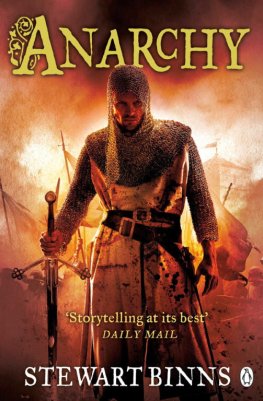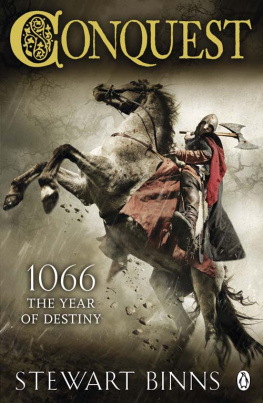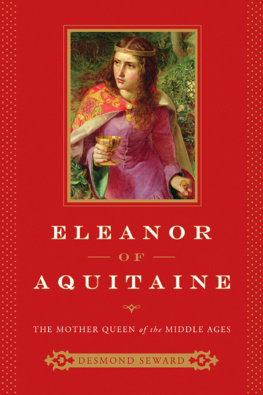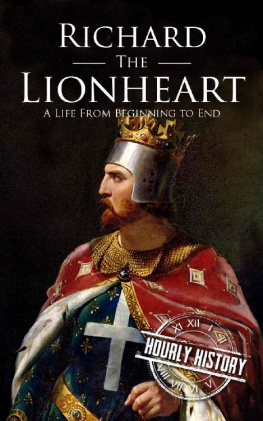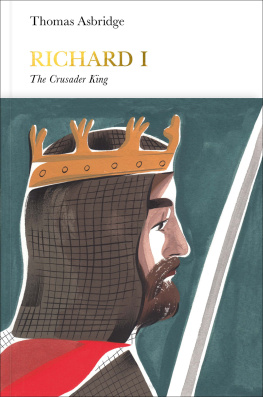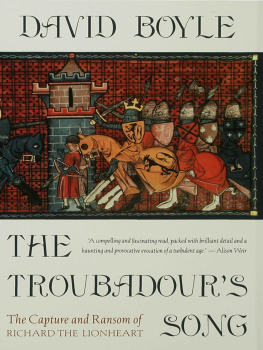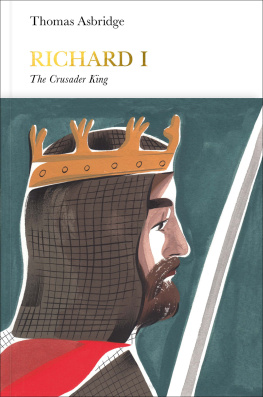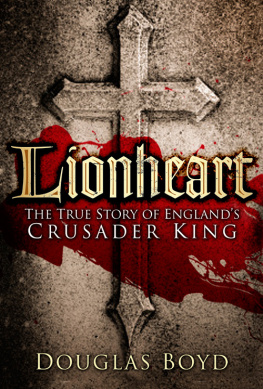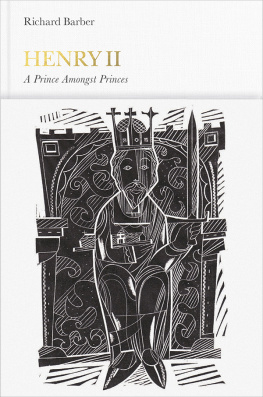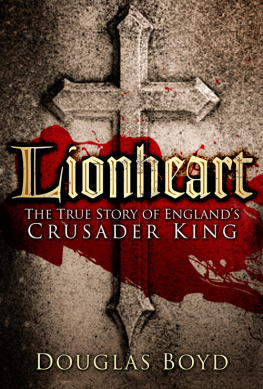To all those who love history
MAP I
England in the Twelfth Century

MAP II
Europe in the Twelfth Century




MAP III
The Eastern Mediterranean and Holy Land in the Twelfth Century




MAP IV
The Routes to the Third Crusade

MAP V
The Holy Land during the Third Crusade

Towards the end of the reign of Henry II, the Plantagenet Empire stretched across a huge swathe of north-west Europe. The Scots had declared their fealty to Westminster, and Ireland and Wales both acknowledged the English King as their liege lord. Across the Channel, all French domains save those of the King of the Franks, in Paris, and the Count of Toulouse were part of a vast realm that stretched from the north of Scotland to the Pyrenees.
Like his father before him, and his Norman predecessors before that, Henry was all-powerful, especially when allied with his remarkable wife, Eleanor of Aquitaine. Fortunately, their lineage included sufficient sprinklings of the blood of their diverse subjects, including the English, to keep any adversaries at bay. However, Henry and Eleanor produced eight offspring who were so formidable they were soon called the Devils Brood. They included two future queens and two kings, but the most remarkable of all was the sixth child, Richard, Duke of Aquitaine, who would be called Lionheart before the age of twenty and fifteen years before he would become King of England.
His physical presence, his domineering personality and his remarkable military prowess not only as a general of armies but also in hand-to-hand combat made him a legend in his own lifetime. His struggles during the Third Crusade against the Sultan Saladin (himself one of the most revered men in Muslim history) soon became one of the most compelling stories of the Middle Ages.
But there was more to Richards lineage than he realized. When he became King of England on 6 July 1189, there were two men with him who had been charged with protecting the young King and guiding his future. One of them was a knight of the realm, chosen for his martial skills and personal integrity, and the other was a monk, a wise man of letters, who carried vital clues about Richards past evidence that would shape his future and that of England. This is their story.
When I first saw the old man, it was as if I was looking at an apparition, a venerated image held in my memory since childhood.
As a boy, I had been told the stories about Englands ancient heroes many times: the great King Harold and his mighty housecarls, who fought to the death at Senlac Ridge in a valiant attempt to defeat the Conquerors Norman army; the gallant defenders of the Siege of Ely, the last of the brave souls who had defied Norman rule; and the most courageous of them all, Hereward of Bourne, the leader of Englands final rebellion, about whom people still spoke with hushed reverence.
These men of legend wore their hair and beards long, carried the round shields of Saxon tradition and went into battle wielding their fearsome battleaxes. But they were from another time, a distant memory. Senlac Ridge had happened over a hundred years ago, and even though there were a few old men alive who claimed that their grandfathers could remember Hereward and the early days of the Conquest, no one really believed them.
Now everyone trimmed their hair and beards like our Norman masters. We wore Norman clothes, with their elaborate embroidery and rich colours, and we carried Norman weapons and armour. To all intents and purposes, we were Normans except in our hearts, which still coursed with English blood.
But the old man in front of me did not resemble a Norman. Apart from his age he must have been well into his seventies he was the epitome of the English heroes of the past. Of a winters eve, when I had sat by the fire and listened to my father tell me tales of Old England and enjoyed the ancient ballads sung to me by my mother, in my imagination I had conjured images of formidable warriors just like the man I now faced.
He was tall and broad-shouldered, with a prodigious mane of silver-grey hair flowing down the back of his heavy cloak. His hoary beard fell in gentle waves and came to rest on his chest. His weapons and armour, unmistakeably Old English, shone with a lustre born of diligent care. With eyes that were clear and sharp and skin that, although wrinkled and weathered, glowed with ruddy health, he was the living embodiment of a little boys fantasy of heroes long gone.
But he was a contemporary lord and, by the look of the heavy seal on his ring and the ermine trim to his cloak, an earl of the realm. As far as I knew, all our lords were Normans. How was it possible for a man to be a Norman earl and yet appear to be the embodiment of Englands past?
It was September 1176. I had been summoned to Wolvesey Castle in Winchester by the royal warrant of the man I served, Henry Plantagenet, King Henry II. I was part of the Kings retinue at Westminster and commanded a squadron of his cavalry. I had been dubbed a knight of the realm, which, as an Englishman, was as high as I could hope to rise in the military hierarchy of the Norman army. I was twenty-five years old and needed only to complete another eight to ten years service before having sufficient savings to buy a small estate and live out my days in relative comfort. I would have needed a wife, of course, and I had already begun to cast my eye over suitable young ladies within Londons merchant families.
Again, I was hindered by my kith and kin. The ladies of the court were almost all from Norman families and, in the main, beyond the reach of a lowly Englishman like me, no matter how eligible I may have thought I was. However, many of Londons merchants were Englishmen who had managed to make their wealth by cosseting the Norman elite. So, one of their daughters was the finest bride a young buck of my modest lineage could hope for.
Lifes course seemed fixed for me; I had done well, especially for an Englishman, and, as often as I could, I remembered to tell myself to count my blessings. But a life with a secure future is not necessarily a contented one. I often yearned for more, but what more might be was never clear to me. When the yearnings became stronger, I made them go away by convincing myself that everyone wanted more in their lives money, women, adventure, fame and that it was childish to crave unattainable rewards.


